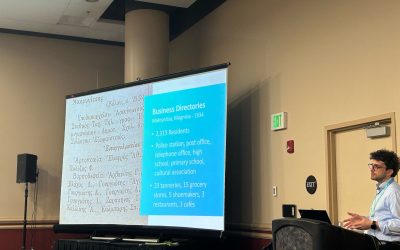By George Zimmar
The end of senior year was festive as I joined classmates to party. My parents had purchased a new 1955 Mercury sedan, with a blazing red and white two-tone color. Since my parents did not drive, I was charged with driving duties and used the car to travel to school on occasion, and my popularity rose. Classmates Melba Maltenfort and Jane Kontos gave large parties the week before graduation that were open to all seniors, but the former attracted Jewish students and Jane’s party mostly Christians. I attended both, but Jane’s party was self-revelatory.
The Kontos’s were a large well-to-do Greek family who lived in a four-storey gated mansion at 4624 South Ellis Avenue, Chicago. At the party, I peeked into the kitchen as Jane’s four adult brothers and father, home from work, sat at a large table eating their late dinner soup, with a rack of lamb chops, hot off the grill, cooling on the counter and large chunks of broken bread on the table; I found the masculine and almost medieval scene arresting. Jane and I attended the St. Constantine and Helen Church at 7351 South Stony Island Avenue and were Greek Orthodox Youth Association (GOYA) members. Jane was a Greek American girl, much like the girl that my mother and father felt that their sons should marry. Jane was family oriented, pulled her weight in the family business, was deeply religious, and would make a perfect mother and respectful daughter-in-law. There was no ambiguity about my parents’ wishes in the choice of mate. My wife was to be Greek American and from a good family. Jane fit their qualifications perfectly. I believe that this parental demand was the crux of the conflict I felt between the embrace of my Greek identity and the desire to push away my Greekness.

For the children of immigrants, adaptation to both the family’s original culture, be it Greek or Dominican, and the majority culture, be it American or Canadian, is essential. If the adaptation is assimilation, the original culture is rejected, and the majority culture is adopted. For instance, the children do not learn the language (Greek), do not participate in its religious and cultural activities, and instead fully adopt the norms, practices, and values of the majority culture. When it comes to the choice of a marriage partner, the mate typically comes from the majority culture, and family support declines. Two of my wife’s brothers, Steve, and Nick, had a scant knowledge of Greek, saw themselves as Americans, and married non-Greeks.
On the other hand, if the adaptation is integration, the original culture is adopted and embraced and family support may be preserved. In this instance, the original language (Greek) is learned, along with the norms, practices, and values of the majority culture. Depending on the choice of a marriage partner, family support may be conflicted. If the partner is Greek, then there is family support for the marriage. If the partner is not Greek and the family desires a Greek partner, then the family and the child may be in conflict. This is a situation in which the immigrants have maintained their identity but the child has integrated. Obviously, culture stress is present in both assimilation and integration but is greater in the former without family social support; stress also can be great on children, who are often torn between cultural assimilation and integration, between preserving family ties or fraying them.
Adolescence is the inception of individuation, an integral part of psychologist Carl Jung’s Analytical Theory. It involves the process of coalescing the conscious and unconscious mind, such that the person becomes a distinct personality from all others. The self or ego becomes unified with the personal unconscious and what Jung calls the collective unconscious—that aspect of the unconscious which all humans share. The mother–child bond is an example of the collective unconscious present in all human cultures. When a bond is missing between mother and child, the child fails to individuate fully. The bond between son and father is also part of the collective unconscious and significant to gender and role identity. The self or ego is the center of the field of consciousness, which contains our conscious awareness of existing and a continuing sense of personal identity. The world we experience, our awareness of others, and our self-awareness are expressed through the ego. Self-esteem is damaged when the individual feels guilt or shame. As a result, individuation is impeded. At the personal unconscious level, our conflicts find contention, but we are often unaware of what is brewing deeper in the unconscious.

Jane Kontos and I were classmates, belonged to the same church and youth groups, and lived in the same neighborhood. Although our family finances differed, both families were broadly middle class. Moreover, Jane was a fine young girl. From my mom’s perspective, someone like Jane, who is Greek, would be the ideal person for me to invite to the prom. No doubt that my dad would concur. If I invited Jane to the prom, I would be in harmony with my parents’ wishes. On the other hand, if I invited another person—say, a Kay Carol Lilstrom, who is Swedish—this would pose some concern for my parents. Why, when there is a lovely Greek girl nearby, would I venture to invite someone outside of our group, a xeni (ξένη)? The girl may be a good person, but she does not share our language, religion, or values of Greekness. To my parents, going out with a Kay, would not make sense when a Jane was perhaps available. This dilemma of an integrating youth with his very Greek parents occurs at the conscious level and the unconscious level, creating conflict at both levels. In a sense, the bond between parents and son was challenged and formed unconscious discord. Thus, my personal unconscious and collective unconscious were in disharmony, and individuation was impeded.
In reality, my parents were not aware that Jane Kontos was perhaps available to invite to the prom; nor were they in any sense aware of Kay Carol Lilstrom, or even of my intention to ask someone to the senior prom. It was an unconscious conflict. Though I was aware of my parents’ strong feelings and attitudes, I told myself that they would not care that I took a non-Greek girl to the prom. On the other hand, I also knew that in protest of my first cousin Susan’s wedding to a non-Greek, my father, Peter did not attend the ceremony. I both believed and did not believe in my parents’ disfavor toward the choice. Herein lies the conflict: I was of two minds, and as a result impeded the integrity of my personal development for the next decade of my life.
I pulled the bright red Mercury before Kay Carol’s house. Corsage in hand, I went to the door and in my politest manner greeted Mrs. Lilstrom, gave assurances that her daughter would be as safe as a virgin princess carrying a cup of gold on the silk road from Beijing to Samarkand, arriving home with her gold and virginity intact. And off we went to the senior prom at the Palmer House Hotel.
Did you like this “Yiayia & Me” story? Help us with the next one!
Share your story or consider a donation and make your Yiayia proud!



